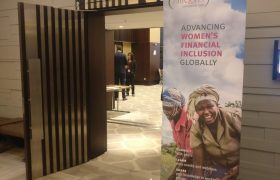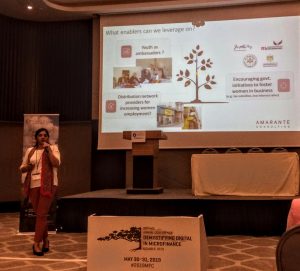
“We like to say Financial health instead of financial inclusion since just financial inclusion also has its limits” said Sarah Willis, Director of Metlife Foundation, who along with Yasmin Bin Humam from CGAP, kicked off the Finequity event held in Istanbul, Turkey on 29th May, 2019. Finequity, is a global community which serves as a platform for learning and exchange on a range of issues related to women’s financial inclusion.
At the event, Amarante shared key Insights on digital and financial inclusion of women. Through work and collaboration with various development, public and private sector stakeholders in Egypt and Jordan, our Managing Director, Sahana Arun Kumar, talked about barriers and enablers to women’s financial inclusion in these two countries. Some encouraging highlights were:
- Private sector players are starting to target more women users. They believe women are excellent brand ambassadors. “A happy woman client will definitely bring in 5 more”, said one service provider we interviewed.
- Both countries have very dynamic Fintech markets and the level of women entrepreneurs, though low when compared to their male counterparts, is encouraging. For example, a recent survey on financial literacy of young entrepreneurs in Egypt* shows 36% of the respondents were women. In the post start up phase, 20% of the total respondents were women but this number went up to 50% when looking at pre start up / idea stage entrepreneurs.

Some of the member speakers who shared their work include: Laura Fernandez Lord- Head of Women’s Economic Empowerment at BBVA Microfinance Foundation, Lelemba Phiri- Principal of Africa Trust Group, Juan Navarrete- Vice President of Business and Partnership Development from Fundacion Capital, among others. Changing gender norms was a focus point of the event with a panel discussion that showcased research and experience on social norms and how they impact women behavior. More and more youth, earning women and entrepreneurship dynamics are changing those norms and influencing the way both men and women react to issues like women financial privacy and household financial decision making.
The day also saw the audience break into working group meetings involving 1) Social norms, 2) Technology and myths around women’s use of DFS and 3) Data and Measurement. Lunch time saw some very interesting pop up shares. Our very own Senior Consultant Audrey Misquith, working as a DFS expert with UNCDF in Nepal, talked about remittance-based use cases for Nepalese women. Since in Nepal, men dominate out-migration , with women receiving remittances, it is important to think about women’s realities and needs to inform product and channel design. Specifically, how we deliver products is crucial in a market that is cash-based and thrives on communal, informal networks. The transition from cash to digital for women remittance recipients needs to be paced and thoughtful, allowing them to derive meaning from this journey.
Overall it was a power packed day with dynamic and diverse set of speakers and audience giving rise to interesting debates and great networking. The session concluded with some thoughts on how enablers could increase involvement and usage of digital financial services amongst women.
For the complete presentation on ‘Digital and Financial inclusion of women: Insights from Egypt and Jordan’ click here
Thank you FinEquity for the opportunity to learn and share together!
_____________________________________________________________________________________
* This study was conducted as part of a larger feasibility study to which Amarante brought design and implementation recommendations. The study analysed financial literacy among young entrepreneurs and preferred strategies for improving the degree of literacy. Sample size was 500 respondents in total, including 181 women.